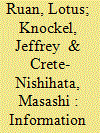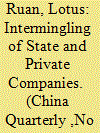| Srl | Item |
| 1 |
ID:
179772


|
|
|
|
|
| Summary/Abstract |
When does repression of online expression lead to public punishment of citizens in China? Chinese social media is heavily censored through a system of intermediary liability in which the government relies on private companies to implement content controls. Outside of this system the Chinese authorities at times utilize public punishment to repress social media users. Under China’s regulatory environment, individuals are subject to punishment such as fines and detention for their expressions online. While censorship has become more implicit, authorities have periodically announced cases of repression to the public. To understand when the state escalates from censoring online content to punishing social media users for their online expressions and publicizes the punishment, we collected 468 cases of state repression announced by the authorities between 1 January 2014 and 1 April 2019. We find that the Chinese authorities most frequently publicize persecutions of citizens who posted online expression deemed critical of the government or those that challenged government credibility. These cases show more evidence of the state pushing the responsibility of ‘self-regulation’ further to average citizens. By making an example of individuals who post prohibited content even in semi-public social media venues, the state signals strength and its determination to maintain authority.
|
|
|
|
|
|
|
|
|
|
|
|
|
|
|
|
| 2 |
ID:
179290


|
|
|
|
|
| Summary/Abstract |
This paper examines the relationship between political events and information control on WeChat through a longitudinal analysis of keyword censorship related to China's 19th National Communist Party Congress (NCPC19). We use a novel method to track censorship on WeChat before, during and after the NCPC19 to probe the following questions. Does censorship change after an event is over? What roles do the government and private companies play in information control in China? Our findings show that the system of information control in China can trigger blunt reactions to political events. In addition to critical content around the Congress and leaders, WeChat also censored neutral and potentially positive references to government policies and ideological concepts. The decision making behind this censorship is a product of the interaction between the government, which influences actions through directives, and the companies, which ultimately implement controls on their platforms. While this system is effective in compelling companies to implement censorship, the intermingling of the state and private companies can lead to outcomes that may not align with government strategies. We call for a deeper understanding of the role of private companies in censorship and a more nuanced assessment of the government's capacity to control social media.
|
|
|
|
|
|
|
|
|
|
|
|
|
|
|
|